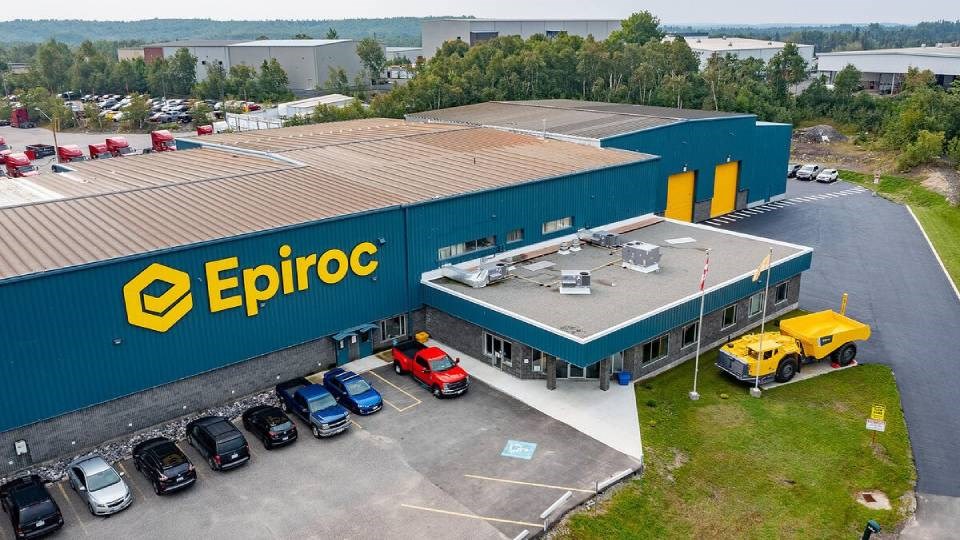Epiroc's new remanufacturing centre in Sudbury is so bright and orderly, it belies the industrial work taking place inside.
Operational since last fall, the facility is sleek in its design, pristine in its cleanliness. There is a place for every item and every item is in its place.
That's intentional, according to plant manager Brian Bernier.
"Customers that come through this building say, ‘Wow, it's clean,’” said Bernier, who’s been with the company for close to 30 years. “It's a clean environment and it stays that way all the time.”
At the new hub, situated in Lively just outside the city, broken and worn out parts from industrial vehicles arrive from underground mining jurisdictions from around the world. Epiroc's service technicians refurbish them to like-new condition, and then they re-enter the company’s inventory for reuse.
The centrepiece of the shop is the test bench, which puts each component through a series of strenuous scenarios that mimic its intended use to ensure it’s been remanufactured to a high quality.
Want to read more stories about business in the North? Subscribe to our newsletter.
“Every component gets tested to the highest standard, higher than the original equipment manufacturer (OEM) recommends us to do,” Bernier said. “That way, if there are any imperfections in our quality of the build, things get noticed and checked right away.”
Epiroc opened a similar centre, specializing in components for surface-related equipment, in Tucson, AZ.
Any leftover materials that can’t be repurposed – from the steel to the oil – are all recycled to reduce waste.
“Remanufacturing is recycling; it's a proper way of doing things in the environment today,” Bernier said.
“So, you're not throwing it out; you're not leaving it in the boneyard. Give me the core back and we remanufacture it."
Headquartered in Stockholm, Sweden, Epiroc manufactures a range of equipment used in mining and construction, from drill rigs and haul trucks to raiseboring equipment.
The remanufacturing, or “reman,” program has existed in Canada since the late 1990s. At that time, the company referred to it as an exchange program, and it only applied to one or two components, Bernier said.
But as the program caught on with more customers, additional items were included and the initiative continued to grow.
It's common among some companies to simply buy a new component, Bernier said. Yet, repairing and reusing existing parts also cuts down on expense. The cost of a remanufactured transmission is only 70 per cent of the cost of a new one.
Enrolment in the program can help companies forecast the life of major components and budget for replacements, Bernier said, while allowing Epiroc to better manage its supply.
Three years ago, with demand for new parts soaring, Epiroc decided to take the reman program global, but that meant the company needed more room.
Until now, the reman program had operated out of a 5,000-square-foot space within Epiroc’s original Sudbury facility where full-sized equipment is manufactured, Bernier said.
“We were in a corner of the building and the rest was all for the new machines, remanufactured machines,” Bernier said. “We outgrew it.”
Sign up for the Sudbury Mining Solutions biweekly newsletter here.
Plans for the new facility started taking shape in the fall of 2019, and construction – which had to take a six-week pause due to the COVID-19 pandemic – was completed about a year later, he noted.
Epiroc took over a location in a building owned by Bristol Machine Works, gutting the existing space and rebuilding it from the ground up.
At 22,000 square feet, the new facility is more than four times the size of its former location, and there's still room to grow.
It’s been designed to provide the best service for customers, but also with the health and safety of employees in mind.
Visitors to the locked facility must check in digitally, take their temperature, and sanitize their hands at the check-in station.
Office staff are situated in a modern, stylish configuration with stand-up desks and ergonomic seating, while the shop is equipped with assistive devices like cranes and workbenches to reduce physical strain on the service technicians.
“This facility is taking it to a different level,” Bernier said. “We’ve taken this place and we’ve changed the way we've done things. We’re looking at ergonomics; we’re looking at better tooling for our people so that they can do the job longer.”
Epiroc hasn’t been immune to the challenge of finding skilled trades workers, Bernier said, and so creating an environment that prioritizes employee comfort was a considered decision on its part.
In addition to retaining experienced, knowledgeable employees longer, the company also wants to attract new workers to the industry, including women.
Making the job safer and less physically taxing may be a couple of ways it can make that happen.
“It’s about protecting the employee and the longevity of the employee,” Bernier said.
“It’s not just for the new employees coming in, but for the older employees who can’t swing a sledgehammer anymore.”
The Drift features profiles on the people, companies and institutions making important contributions to Greater Sudbury’s mining sector. From exploration, operation and remediation to research and innovation, this series covers the breadth of mining-related expertise that was born out of one of the world’s richest mining camps and is now exported around the world.
